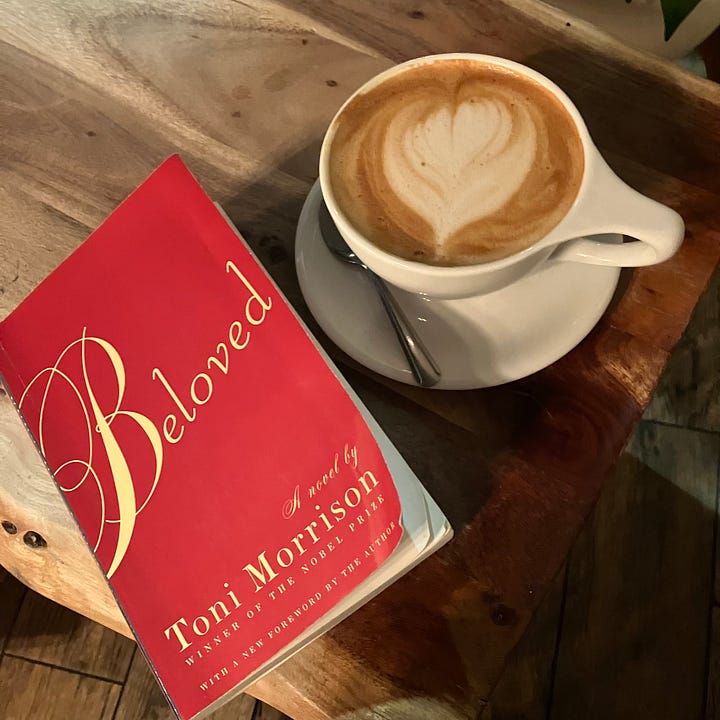'Beloved' by Toni Morrison | Notes on Slavery, Dehumanization, & Being A Haunting
Book Reflection
I read the last hundred pages of Beloved by Toni Morrison on a cold night at a cafe, sipping a cappuccino spiked with cinnamon and maple syrup. The absence of sun was causing the weather to drop below 60 degrees. As the temperature dropped, so did rain. The last days of autumn have been full of mundaneness, cold puddles of rainwater, and fallen leaves.


Beloved by Toni Morrison is a subtle horror. You as the reader are launched in the midst of an unrecognizable, grief-filled story. Within such eerie circumstances, is prose on prose of hope and lush descriptions. It’s a mind-play, making readers question whether or not things are as scary as they seem on the outside looking in. It’s exploring what a future looks like when the past has been full of violence and tragedy.
The entirety of the book is placing an emphasis on the horrifying psychological impacts on the people whom endured slavery. And the ways in which those impacts pass to the next generation.
Morrison merges the perspective of cattle, enslaved people, and newly freed people, whilst simultaneously switching out of third person and into first person. It carefully examines the dehumanization of enslaved people. Specifically, highlighting the fictional life of a woman named Sethe. She was once enslaved and is now living as a free working woman. She is living in a home that is referred to as 124. The home is haunted, containing the spirit of Sethe’s first daughter whom she murdered. The details of the murder are gruesome, yet extremely understandable. The story takes a hopeful, yet dark turn when the spirit of the baby is reincarnated into the flesh of a woman the same age that baby would’ve been. Her name being Beloved.
“To Sethe, the future was a matter of keeping the past at bay. The ‘better life’ she believed she and Denver were living was simply not that other one.” (Beloved, pg. 51)
Toni Morrison has a habit of making her most layered characters (and the known antagonist) the title of the book. We saw it also in Sula. Though the story somewhat focused on a different character throughout the novel, the antagonist was awarded the title. This book was no different.
The figure in which the story revolves around is the murdered, not the murderer.
It shows the layers of motherhood during and post chattel slavery. And the ways in which Black women were often treated as cattle. We see this through Sethe when she explains how one of her old owners whipped her while she was pregnant and stole her breast milk.
We watch Sethe come to terms with her own existence. An existence within a body that feels alienated, a past full of trauma, and in a world in which she believes the only thing valuable — that is of herself — is her children.
“For a used-to-be-slave-woman to love anything that much was dangerous, especially if it was her children she had settled on to love.” (Beloved, pg. 54)
Whilst understanding Sethe of that manner, we are watching Denver succumb to loneliness in a haunted house. The only thing that has kept her company throughout the entirety of her life has been the spirit of her late sister. This loneliness that fills Denver grew and morphed into something dark and dangerous. It causes her to grasp onto Beloved. Even when she shouldn’t.
“Denver’s imagination produced its own hunger and its own food, which she badly needed because loneliness wore her out. Wore her out.” (Beloved, pg. 35)
“Whatever power and however she used it, Beloved was hers. Denver … felt helpless to thwart it, so unrestricted was her need to love another.” (Beloved, pg. 123)
Beloved is a book that needs to be savored. This read was an uncomfortable necessity. As you read, you feel as though you’re drowning. You, as the reader, feel as helpless, haunted, and hunted as the characters feel.
Your privilege lies in the fact that you can close the book and retreat back to safety.
“It aint my job to know what’s worse. It’s my job to know what is and to keep them away from what I know is terrible. I did that.” (Beloved, pg. 194)
The novel is a fierce plea to remember the history of slavery and the pain in which enslaved people endured during and after the years of it. It’s a call to not banish the history that is bloody and gruesome. But rather analyze and examine it closely, learning from it, so it’s not bound to repeat.






Yulani- Morrison is one of those greats whose words I will never tire of rediscovering. When I’m worn out, her words—in wearing me out—takes me out of such forlorn state. I appreciate this reminder.
Having just read this - this review is perfect! You have captured so eloquently the tension and horror that is on the page. I’m slightly intimidated at the thought of having to review this myself in the coming days. Because right now there are no words!